Hiring a project manager can be a daunting task. You may even wonder why you need to hire a project manager. For example, if your organization is hiring data scientists, you may think the data scientists will be able to manage their projects. It’s a common misconception. Sure, data scientists can do that to some degree, but a project manager can help your organization in immeasurable ways.
For instance, a project manager will help improve the quality of your data science project, reduce the time it takes to complete it, and ensure that your organization meets its goals. Learning how to hire a data scientist who can collaborate effectively with a project manager is equally important for driving success. How do you hire a project manager? This guide will provide valuable insights to help you confidently tackle this task to achieve your objectives, such as allowing healthcare organizations to use innovative data management.
Azulity’s provider credentialing services can help you reach your goals by reducing the time it takes to onboard healthcare data scientists so they can begin their work sooner. The fewer delays you face, the more effective your data governance project will be.
Roles and Responsibilities of Project Managers

Project Managers: The Skilled Pros that Make Sure Your Project Gets Done Right
As the name suggests, project managers are responsible for projects from initiation to close, ensuring the work gets done efficiently and satisfactorily. As team leaders with day-to-day schedules that are constantly changing, a static project manager job description would be hard to come by. Days can be filled with planning the project process, assigning project management tasks, creating a budget, managing a team or communicating with clients.
Project managers span across a wide range of industries, from engineering to financial services. Every company wants to keep costs down without lowering standards; project managers help make this possible.
The Roles and Responsibilities of a Project Manager
Though there are variations in project management positions across industry lines, the general project manager’s duties remain the same. The responsibilities of project managers include:
- Plan and develop project scope
- Create and lead a team
- Monitor project progress and set deadlines
- Overcome obstacles that arise
- Manage the project budget
- Ensure stakeholder satisfaction
- 7Evaluate project performance
Plan and Develop the Project Scope
Every project starts as an idea. A project manager’s responsibility is to work with internal stakeholders and external clients to define that concept and create a process to bring it to fruition. This includes setting and managing client expectations, developing a detailed project plan, limiting the project’s scope, understanding project risks and assigning team members to specific tasks.
Create and Lead a Team
Project managers are accountable for every aspect of the project, including leading a team capable of meeting or exceeding client expectations for their vision. Successful project managers assemble and manage these individuals to make a fine-tuned project machine. If the team needs guidance, training or coaching, a project manager must set them up for success. To build and maintain a dynamic team mentality, a project manager must be able to maintain open and honest communication, form working relationships, and motivate anyone who needs it.
Monitor Project Progress and Set Deadlines
Organization and follow-through are a big part of a project manager’s role. From creating an accurate timeline of project completion to ensuring tasks are finished within the confines of the assignment, the project manager must remain aware of how the project is progressing. The project manager also anticipates delays that may occur on the client side and apprises the team of any changes in the client’s needs.
Overcome Obstacles That Arise
During every project, issues arise that need to be solved. The project manager is the first person to whom clients and team members turn when something goes wrong, so it is in these professionals’ best interest to anticipate any potential hiccups before they happen. Adaptability and problem-solving are key to keeping control of a project.
One issue that project managers need to have a plan for is change or expansion in a project’s deliverables throughout a project, also known as scope creep. This usually occurs when the scope of a project isn’t correctly defined from the start, and it can seriously affect the budget and ability to deliver on time.
Manage the Project Budget
Budget management is another primary project manager’s duty. These professionals make sure that the project gets done without excessive spending. A good project manager has mastered the art of cost efficiency. Project managers must also be transparent and realistic about the cost so clients know from the beginning how much they are likely to spend.
Ensure Stakeholder Satisfaction
Project managers have the closest relationship with clients of anyone who works on a project. Because of this, they must keep open lines of communication for updates and feedback. If any issues or changes arise in the timeline of a project, for example, the project manager is in charge of keeping the client up to date.
Evaluate Project Performance
After a project is finished, the project manager is responsible for evaluating its efficiency and effectiveness. With the data they’ve tracked throughout the process, they can begin to identify shortcomings and plan for ways to fix similar issues in the future. This is also an opportunity to highlight what went right, including building camaraderie and rewarding team members who excelled during the project.
Related Reading
- Scrum Master Roles and Responsibilities
- Solution Architect Roles and Responsibilities
- What to Look for When Hiring a Project Manager
- Project Executive vs Project Manager
- Mistakes to Avoid When Hiring Developers
- What to Ask When Hiring a Data Scientist
Where to Find Project Managers


Azulity: Targeting Project Managers in Health Care
Azulity specializes in healthcare master data management and provider credentialing services. The company’s focus on healthcare means they deeply understand project management in this space and the terminology and challenges unique to the industry. So, if you’re looking for a project manager to help with a healthcare-related project, consider reaching out to Azulity to see if they have any candidates that would be a good fit.
General Job Platforms: Where to Find Project Manager Candidates
Don’t underestimate the value of good old-fashioned job boards for finding project managers. These general job platforms attract users from all industries, giving you access to many candidates with diverse backgrounds and experiences.
Here are some of the most popular job boards for finding project managers
- LinkedIn: Use LinkedIn’s advanced search filters to find candidates with project management certifications (like PMP, PRINCE2) or specific experience.
- Indeed: Post job listings or search through resumes of potential project managers.
- Glassdoor: Attract project managers by offering competitive benefits and showcasing company reviews.
- AngelList: Ideal for startups seeking project managers experienced in fast-paced environments.
Freelance and Contract Platforms: For Short-Term Project Management Needs
Freelance and contract platforms are great places to find project managers for short-term or temporary project management needs. These candidates are often open to flexible arrangements and can help quickly get your business back on track.
Here are some popular options
- Upwork: Find freelance project managers for temporary or remote roles.
- Toptal: Access highly vetted, top-tier project managers.
- Fiverr Business: Discover freelancers who specialize in project management.
- We Work Remotely: Ideal for remote roles, especially in tech or creative industries.
Industry-Specific Communities: Where to Find Project Managers in Your Niche
If you’re looking for a project manager with specialized knowledge in your industry, start your search in niche community forums and job boards. These candidates will be familiar with industry-specific terminology and challenges, allowing them to hit the ground running on your project.
Here are some good places to start
- Project Management Institute (PMI): PMI’s Job Board is excellent for finding certified professionals.
- Specialized Forums: Look for IT, construction, or marketing forums that include PM professionals.
Networking Events: How to Find Project Managers Through Industry Connections
Networking is a great way to find qualified project manager candidates. By attending industry events, you can meet potential hires and learn more about their skills and experience before reviewing their resumes.
Here are some ways to network for project managers
- Conferences and Meetups: Events like PMI Global Conference or local project management meetups.
- Webinars and Online Groups: Attend virtual events or join LinkedIn/Facebook groups for project management.
Recruitment Agencies: Getting Help from the Pros to Find Project Managers
Recruitment agencies can save you time and effort searching for a project manager. Use agencies specializing in project management or your industry.
Examples include
- Robert Half
- Hays
- Kelly Services
University Career Centers: Tapping Fresh Talent to Fill Your Project Management Opening
Universities offering project management programs can be excellent resources for finding entry-level project manager candidates. Partner with their career centres to attract fresh graduates or interns to help with your project.
Your Network: The Potential of Referrals for Finding Project Managers
Referrals from trusted sources can help you find a qualified project manager quickly. Ask for recommendations from colleagues, team members, or other industry professionals.
Social Media: Searching for Project Managers in the Digital Space
Don’t forget about social media when looking for a project manager. Use Twitter, Facebook, or Instagram to post job listings with targeted hashtags like #ProjectManagerJobs or #HiringPM. You can also search these platforms for candidates to reach out to directly.
How to Hire A Project Manager In 8 Simple Steps


1. Crafting a Detailed Job Description
When you’ve determined the necessity for a project manager at your organization, the first step is to create a thorough job description. To write a solid job description, start by compiling a list of responsibilities for the project manager. Then, compare your list to existing project manager job descriptions. This process can help you identify any unusual tasks that could be removed to create a more standard description.
Next, consult with any internal stakeholders to determine the type of experience they would like the new project manager to have. For instance, if your company has never had a project manager, it may benefit from hiring an experienced candidate, even if it costs more. Conversely, suppose your organization has several project managers and an established training process. In that case, you may be more willing to hire a less experienced candidate and train them to fit your needs.
2. Assessing Applicants
After posting your job description and receiving applications, it’s time to evaluate the candidates. Project manager skills aren’t always transferrable across industries, so assessing candidates for their experience and knowledge of your field is critical. For example, while a construction project manager may possess skills that apply to software project management, many expectations will differ.
Consider having candidates complete skills or personality assessments before moving forward in the hiring process. If the applicants for your project manager position don’t possess the right experience or skills, consider actively recruiting candidates who do instead of waiting for someone to apply. Suppose you’re in a competitive industry or there aren’t many project managers with the qualifications you seek. In that case, you may need to target candidates who are currently employed and coax them to make a move.
3. Conducting Interviews
Before interviewing candidates, prepare a list of interview questions that will allow them to demonstrate their understanding of project management and effective methods for managing projects in your industry. This may include asking for specific details about previous projects and recognizing when a candidate provides evidence of effective project management.
You could also present hypothetical project scenarios and ask the candidates how they would respond. If you’re unfamiliar with project management terminology and best practices, it may help to research before the interview so that you know what to look for. The candidates you interview should be able to answer any project management questions with responses that prove they understand the best ways to manage a project.
4. Extending a Job Offer
Once you identify the best candidate for your needs and company culture, extend a job offer as quickly as possible. Project managers are in high demand across many industries, so moving swiftly when ready to hire can help you secure the desired talent. It also helps to research average salaries for the position in your industry based on location and experience to ensure your offer is competitive.
5. Research Your Specific Industry
Since project manager is a title in many industries, any research you do should relate to your industry specifically. Researching the responsibilities, qualifications, and salaries for sectors you don’t work in won’t be helpful. Your research should cover what applies to your company’s project manager’s work.
6. Be Ready to Pay for Experience
In many industries, project manager is a title that people work up to after years of experience. As such, qualified project managers may have extensive experience in their industry, and hiring them may cost you a pretty penny. However, it’s probably worth it if they have the skills and experience you need to meet your goals.
7. Understand the Certifications
Project managers may have specialized certifications or training in specific methods, especially software development. If your industry is one of these, you want to understand these certifications, how they affect project management, and what might work best for your company.
8. Consider Freelance or Contract Project Managers
Hiring a permanent project manager may not make sense for some companies. Instead, you could hire a freelance or contract project manager who is only paid to work on one specific project from beginning to end. This could be more cost-effective for some organizations.
Azulity specializes in healthcare master data management and provider credentialing services, bringing proven expertise in implementing healthcare data solutions and credentialing across the US. Our comprehensive platform ensures consistent patient, provider, location, and claims data synchronization across all systems and departments.
Key features include healthcare MDM, provider MDM, reference data management, credentialing, and provider enrollment. We serve healthcare technology leaders – from CIOs and CDOs to VPs of data platforms and credentialing – helping them eliminate the costly problems of fragmented data systems. Book a call to learn more about our healthcare master data management services today!
Related Reading
- How to Hire a Software Developer
- Data Architect Roles and Responsibilities
- Quality Analyst Interview Questions
- Data Architect Skills
- Skills Required for Project Manager
- Questions to Ask When Hiring a Programmer
- Data Analyst Skills Needed
- Quality Analyst Skills
- Scrum Master vs Project Manager
- Data Architect Vs. Data Engineer
- Hiring Dedicated Developers vs In-House Developers: What Is Better?
- How to Hire Programmers for a Startup
10 Best Project Management Tools
Project management software is crucial for tracking, managing, and optimizing project performance. With the right software, you can improve team collaboration, enhance visibility across all project stages, and ensure that your projects are completed on time and within budget. Here are 10 best project management tools to help you run smoother projects.
1. Azulity
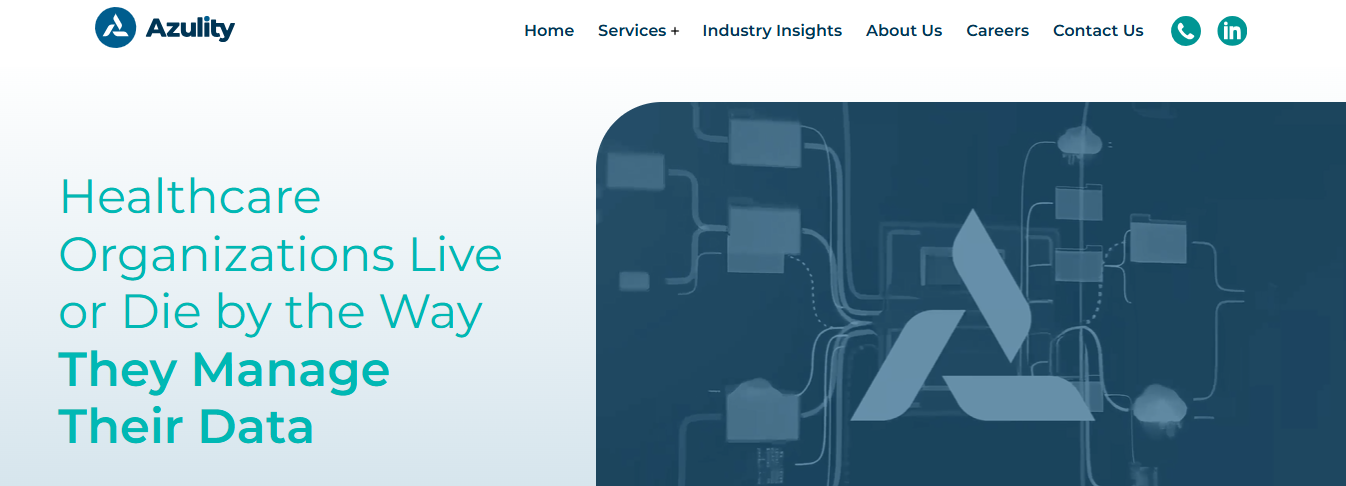

Azulity focuses on managing healthcare master data and provider credentialing services. With years of experience implementing healthcare data solutions and credentialing across the US, Azulity helps healthcare organizations eliminate the costly problems of fragmented data systems. Its comprehensive platform ensures consistent patient, provider, location, and claims data synchronization across all systems and departments.
Key features include healthcare MDM, provider MDM, reference data management, credentialing, and provider enrollment. We serve healthcare technology leaders – from CIOs and CDOs to VPs of data platforms and credentialing – helping them eliminate the costly problems of fragmented data systems. Book a call to learn more about our healthcare master data management services today!
2. Asana


Asana can be a perfect solution for cross-functional teams that work with agile methodologies, such as website project development companies. However, agencies with more robust needs might find that certain features, especially regarding budgeting and financial performance, could be more developed.
Pros
- It offers a free plan. Asana, as a project management software, is primarily concerned with helping small and medium-sized businesses. However, it is not limited to it. Thanks to its free plan, small teams on a tight budget can still have access to affordable project management software.
- Several integrations. This feature more than makes up for Asana’s lack of some features. Some third-party apps and software can be integrated with Asana, including Salesforce, Slack, Dropbox, Google Calendar, and more.
- Time tracking. The Asana app also helps companies and teams see where their time is being spent. Jobs, tasks, and responsibilities are all sorted into different projects, ensuring you won’t overlook anything.
Cons
- We know new users have a hard time understanding the Asana interface. With new users in mind, we’ve created an online tutorial to help guide users through the software and ensure they aren’t intimidated by the interface.
- Asana is not ideal for small teams or single projects: It has overloading features and becomes overwhelming for a fundamental project. When you add new features, you have to balance the complexity of the application, and that’s where the problems start to happen.
3. Wrike
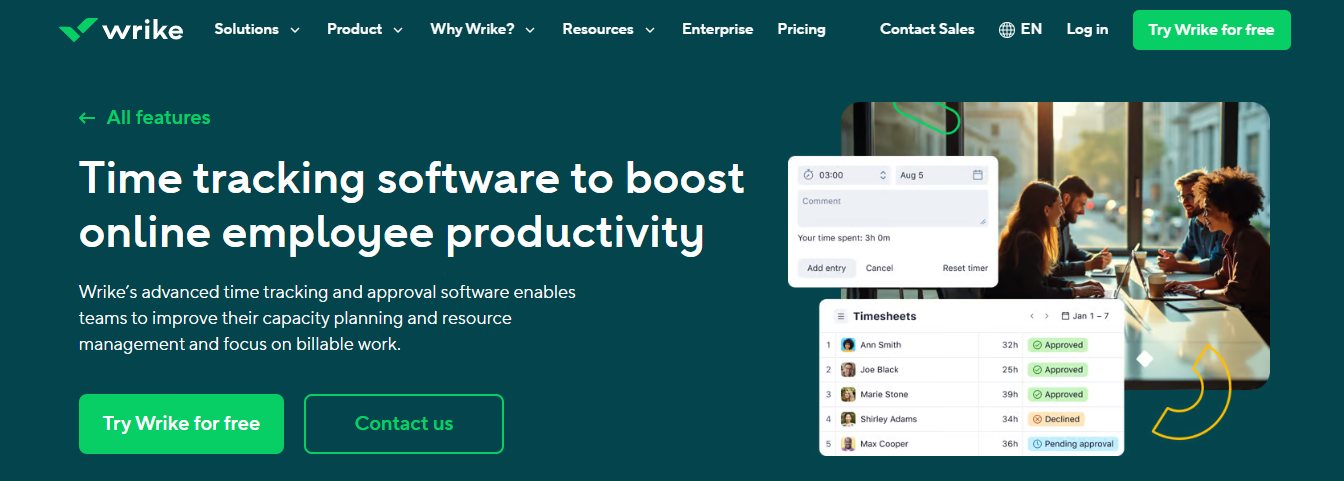

Wrike is a powerful work management platform built for teams and organizations looking to collaborate, create, and exceed daily. Wrike’s solution for agencies creates a central hub that allows teams to monitor all client projects and resources in one place, improve workflow, and track progress. Key features include real-time collaboration, time tracking, cross-tagging for complete visibility, proofing and approvals, resource management, insights, and analytics. Wrike is where agencies unite to delight their clients by completing more projects in less time.
Pros
- Unlimited projects in a free account
- Unlimited subtasks with unlimited levels of nesting
- Kanban, Calendar, and Table views
- Unique customization for marketing/creative teams and professional services
- 20 free external collaborators
Cons
- Gantt chart view is available only in paid plans
- An in-app timer for time tracking is only available on Business plans or higher
4. Clickup
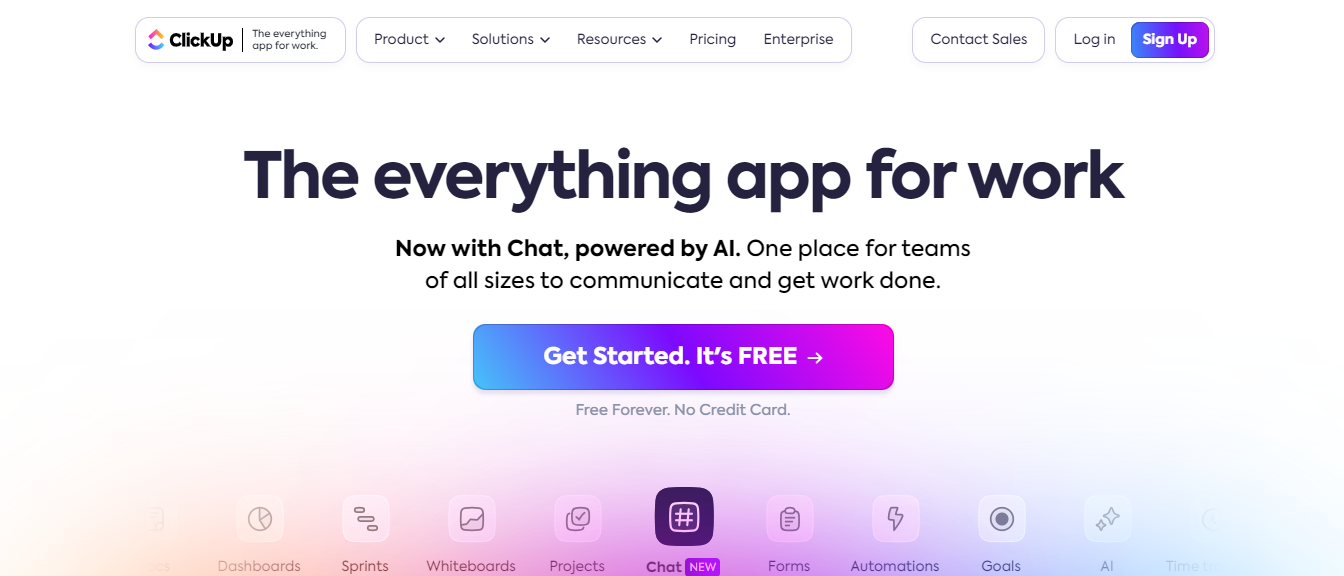

I tested ClickUp’s Free plan to explore its features and capabilities. This marketing project management software provides a centralized hub for handling sprints and adjusting to evolving project requirements. Whether it’s campaign tasks, resources, or deadlines, everything’s in one place for easy access. I liked the freedom to set weekly, monthly, quarterly, or yearly goals. Tracking progress became significantly easier with different project views, including Kanban boards that enhance task visibility. I could schedule daily tasks and reminders to stay on top of project deadlines. Adding to that, custom widgets made it possible to measure ROI efficiently.
Pros
- You can streamline affiliate sign-ups and requests from clients with ClickUp Forms
- Access to Docs, wikis, and more for smooth team collaboration
- Resource management capabilities to track resource workload for best optimization
- Assigned Comments help establish clear task responsibilities
Cons
- It does not offer agile reporting in the free plan
- Too many features on the dashboard can overwhelm users
5. Airtable
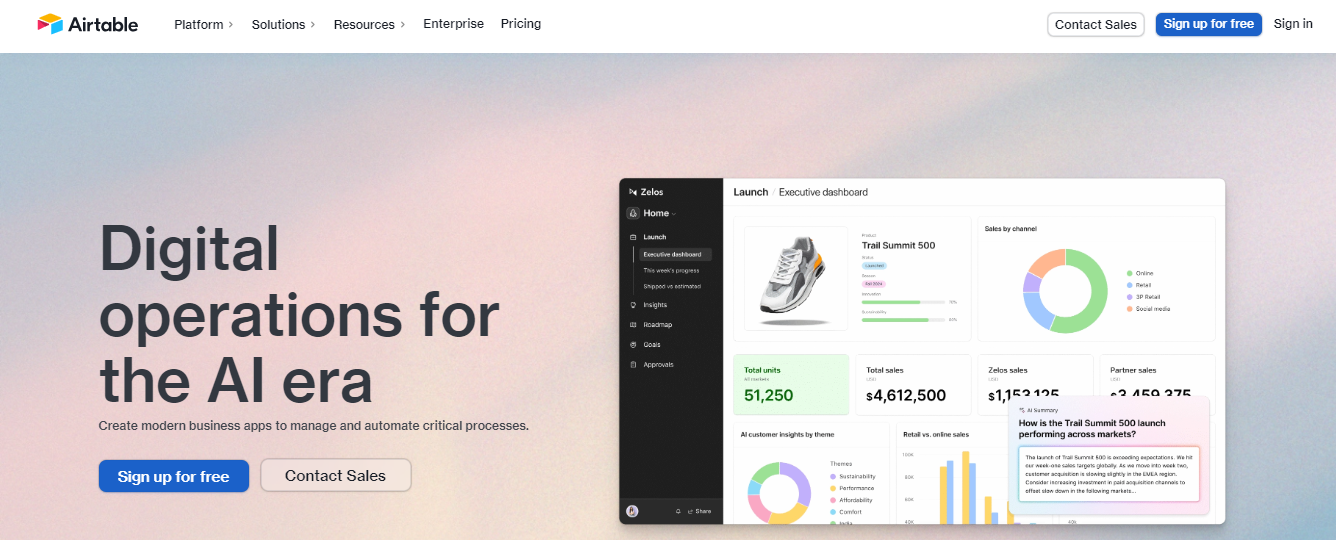

Airtable is a cloud-based collaboration and project management tool that combines an easy-to-use spreadsheet with the potential of a database and the flexibility of custom applications. With Airtable, small teams can create highly collaborative workspaces to work together on projects. The platform also integrates with other apps and services like Slack, Zapier, and Dropbox to provide a complete client management system for customer management.
Pros
- Actions to goals linking functionality to streamline reporting
- Shareable forms to populate records into the Airtable base
- Timeline View to track events, resources, and projects
- Automation with Javascript functionality
- Form View for contact management
Cons
- Limited sorting and filtering options compared to other client management software tools
- Limited customization options for workspace appearance
6. Brafton


The Brafton Content Marketing Platform is a project management tool with one goal: to simplify content marketing for any organization or business. The Brafton Platform accomplishes this by streamlining any content team’s workflows, organizing marketing collateral in an easy-to-use system, and giving visibility into all past and current projects to all pertinent stakeholders.
Pros
- They cover multiple industries and have writers who are experienced in producing content for each.
- They are a one-stop shop for all of your marketing needs. They will create your marketing plan, make your content, and help you promote it.
- Brafton ensures that the content they produce for you is 100% unique and checked for plagiarism.
- Brafton guarantees that your content is formatted correctly and ready to publish immediately. You won’t have to worry about things like using the correct font sizes, headings, and if the layout is correct.
Cons
- The main downside of working with Brafton is that they charge much more than freelancer platforms and other marketing agencies. However, you have to weigh the extra cost against the quality of the content you will receive and the higher level of service you will receive.
- You can’t build direct relationships with any writers who produce your content as you deal with a client manager. This makes it difficult to bring your marketing operations in-house at a later date if you wish.
7. Jira


Jira is a flexible tool that fits well with marketing teams. It supports agile methods like Scrum and Kanban, which help manage marketing campaigns effectively. Its Sprints dashboard offered me a structured way to plan and execute marketing iterations for my company’s campaigns. I also used epics and stories to organize my marketing projects into manageable tasks. Customization is another benefit. Jira can be adapted to your marketing team’s needs with custom fields, workflows, and issue types. Whether you’re a small team or a large enterprise, it scales easily to meet your unique marketing project and campaign requirements.
Pros
- Backlog feature to keep track of marketing tasks, ideas, and user stories
- Comments, notifications, and tags make it easier to communicate about tasks and projects
- Smooth integration with Trello, Confluence, and third-party apps from the Atlassian Marketplace
- Rich dashboard features to track and analyze your marketing project’s progress and performance
Cons
- Weak team chat functionality, such as struggling to connect with colleagues online via the platform
- It takes time to set up projects
8. Bonsai Agency Software
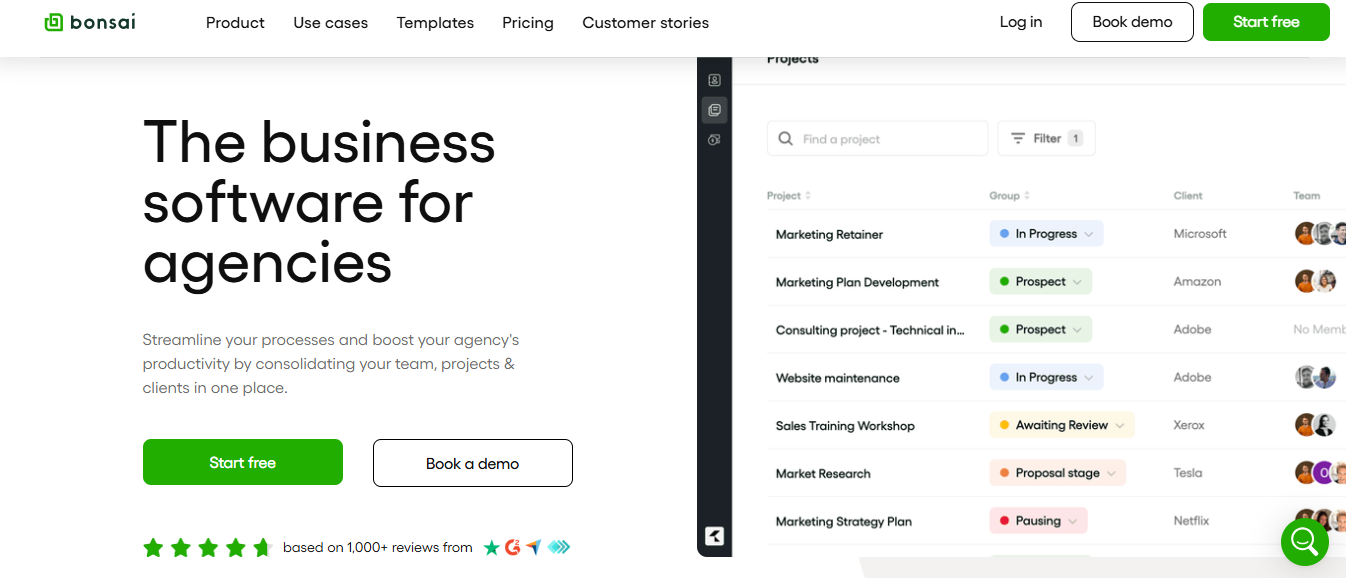

Bonsai Agency Software is an all-in-one agency management tool that simplifies agencies’ lives. It handles everything from project management to client collaboration so that you can focus more on the creative side and less on admin headaches. This integrated approach makes it easy to organize tasks, track progress, collaborate with both your team and clients, and give you a clear idea of how your agency is performing.
Bonsai also includes time tracking, client onboarding, resource management, and automated workflows to keep your operations running smoothly, ensuring projects stay on schedule and within budget. It offers various visual tools like Gantt charts, Kanban boards, and list views to help you stay organized and see everything at a glance.
Real-time reporting gives insights into profitability, resource utilization, and your agency’s overall health. Additionally, Bonsai simplifies the process of managing agency finances. You can track expenses, send invoices, and handle budgeting in one place. Bonsai is a solid pick if you’re looking for a tool to streamline your agency’s operations and boost productivity.
Pros
- User-friendly interface
- Client-centric focus
- Strong focus on small businesses
- Affordable pricing plans
- There is no need to switch between several tools as Bonsai offers an all-in-one approach
Cons
- Limited advanced project management features for larger enterprises
- Bonsai integrations are fewer compared to some competitors (although Zapier integration expands its possibilities)
- The mobile app could be further enhanced with additional features and functionality
9. Pipedrive
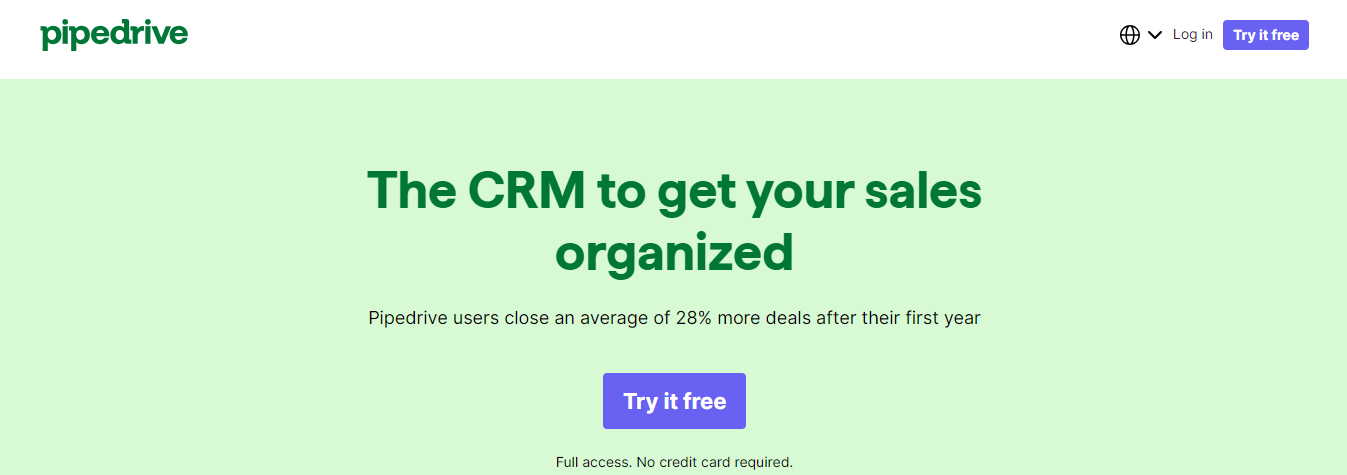

Pipedrive is a CRM system designed to help sales teams increase productivity and close more deals. It offers various features that help streamline the sales process, including contact management, email tracking, call logging, lead scoring, sales forecasting, and automated workflows. With Pipedrive, a sales team can quickly organize their leads, contacts, and deals to stay focused on the tasks that matter. The client management app allows users to easily create custom pipelines and automated emails to help nurture leads and increase conversions.
Pros
- Segment leads to create personalized, targeted communication
- Drag-and-drop interface to quickly update deal statuses
- Activity reminders and team collaboration
- Customizable web forms
- Revenue forecasting
Cons
- Limited customization for user permission settings compared to other free client management software
- Project scope and document management tools are paid add-ons
10. Insightly


Insightly delivers a lot of bang for your CRM buck. It’s one of the easiest to use among the tested systems, even if it’s not quite as feature-rich as some. Importing data is a smooth process. Insightly’s built-in reporting engine is AI-powered, providing one-button data export to Microsoft Power BI.
Pros
- Smooth data input and sharing
- Slick interface that’s consistent and easy to pick up
- Highly customizable
- Easy integration with Insightly’s help desk and marketing apps
Cons
- Expensive high-end tiers
- Lacks advanced features like custom workflows
Book a Call to Learn More About Our Provider Credentialing Services
When hiring a project manager, looking at resumes and portfolios is a great start. But you’ll want to dig deeper to understand what makes a candidate tick. This means conducting thorough background checks, including checking references and previous employers. When talking to references, ask pointed questions about the candidate’s ability to manage projects and teams and their organizational and communication skills.
A candidate may even come with a project management certification from a reputable organization. While this speaks to their knowledge of project management processes, it doesn’t guarantee success on the job. Speaking to references will uncover any red flags and give you a better idea of the candidate’s true capabilities.
Azulity focuses on managing healthcare master data and provider credentialing services. With years of experience implementing healthcare data solutions and credentialing across the US, Azulity helps healthcare organizations eliminate the costly problems of fragmented data systems. Its comprehensive platform ensures consistent patient, provider, location, and claims data synchronization across all systems and departments.
Key features include healthcare MDM, provider MDM, reference data management, credentialing, and provider enrollment. We serve healthcare technology leaders – from CIOs and CDOs to VPs of data platforms and credentialing – helping them eliminate the costly problems of fragmented data systems. Book a call to learn more about our healthcare master data management services today!
Related Reading
- Data Analyst Recruitment Agency
- Best Recruiters for Product Managers
- Honeypot.io Alternatives
- Data Science Recruiters
- Turing.com Alternative
- Scrum Master Skills
- Scrum Master Recruitment Agencies
- Lemon.io Alternative
- Data Science Skills
- Solution Architect Skills
- Dice.com Alternatives